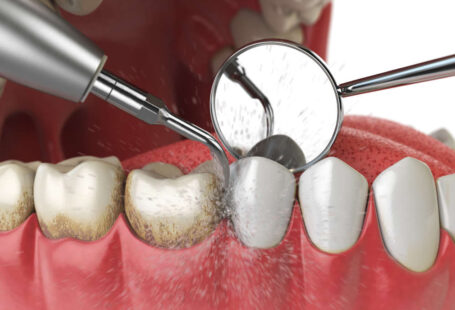How do you stop a kid’s toothache fast?
Stopping a child’s toothache quickly involves addressing the pain and soothing the affected area. Here are steps to help alleviate a child’s toothache:
- Clean the Area: Ensure that the child’s mouth is clean. Gently rinse their mouth with warm water to remove any debris or food particles around the painful tooth.
- Floss Gently: If you suspect there might be something stuck between teeth causing the pain, use dental floss to gently clean between the teeth. Be very gentle to avoid causing additional discomfort or damage.
- Pain Relief Medication: Over-the-counter pain relievers suitable for children, such as acetaminophen or ibuprofen (in appropriate doses), can help reduce pain and inflammation. Follow the dosing instructions on the product’s label and consult with a pediatrician or dentist if you have any concerns about the correct dosage.
- Cold Compress: Applying a cold compress to the outside of the cheek near the painful area can help reduce inflammation and provide some relief. Use a clean cloth or an ice pack wrapped in a cloth and apply it in short intervals, about 15 minutes at a time.
- Topical Anesthetics: Some over-the-counter oral gels and ointments contain topical anesthetics that can numb the painful area temporarily. Follow the product’s instructions, and make sure it’s suitable for children.
- Avoid Trigger Foods: Encourage the child to avoid hot, cold, sweet, or acidic foods and drinks that may exacerbate the pain.
- Rest and Elevation: If the child’s toothache is accompanied by facial swelling, keeping their head elevated while resting may help reduce swelling and discomfort.
- Consult a Dentist: It’s essential to schedule an appointment with a dentist as soon as possible to identify the cause of the toothache and provide appropriate treatment. The dentist will examine the child’s teeth and recommend necessary interventions, such as fillings, extractions, or other treatments, to address the underlying issue.
- Oral Hygiene: Emphasize the importance of good oral hygiene to the child, including regular brushing, flossing, and using fluoride toothpaste.
- Distraction: Engage the child in activities or games to distract them from the pain. A positive and supportive approach can help ease anxiety and discomfort.
Always consult a pediatric dentist for professional guidance when a child experiences a toothache. Avoid using any medication or home remedy not specifically recommended by a healthcare professional for children. Additionally, be sure to communicate with the dentist about any concerns or symptoms to ensure that the child receives the most appropriate care and treatment.
What can I give my child for toothache?
If your child is experiencing a toothache, there are some steps you can take and over-the-counter (OTC) medications you can use to help alleviate their pain while awaiting professional dental care. However, it’s important to consult with a healthcare professional, such as a pediatrician or dentist, before giving any medication to your child, especially if your child is very young or if you have any concerns about their health or allergies. Here are some options:
- Acetaminophen: Acetaminophen (brand name Tylenol) is often recommended for relieving pain and reducing fever in children. Ensure you follow the dosing instructions on the product label or consult with a healthcare professional for the appropriate dosage based on your child’s age and weight. Do not exceed the recommended dose.
- Ibuprofen: Ibuprofen (brand names Advil, Motrin) is another OTC pain reliever that can help reduce pain and inflammation. Like acetaminophen, be sure to use the correct dosage based on your child’s age and weight and follow the product label’s instructions.
- Oral Gel or Ointment: There are topical oral gels or ointments available over the counter that contain a mild anesthetic to numb the painful area temporarily. Ensure that the product is suitable for children and follow the usage instructions carefully.
- Cold Compress: Applying a cold compress wrapped in a cloth to the outside of the cheek near the painful area can help reduce inflammation and provide some relief. Apply it in short intervals, about 15 minutes at a time.
- Avoid Trigger Foods: Encourage your child to avoid hot, cold, sweet, or acidic foods and drinks that may exacerbate the pain.
- Distraction: Engage your child in activities or games to distract them from the pain. A positive and supportive approach can help ease anxiety and discomfort.
While these measures can provide temporary relief, it is essential to schedule an appointment with a pediatric dentist as soon as possible to identify the cause of the toothache and provide appropriate treatment. Dental issues can worsen if left untreated, so professional care is crucial. Additionally, be sure to communicate with the dentist about your child’s symptoms and any medications or remedies you have used. This information will help the dentist provide the most appropriate care and treatment.
What is the fastest way to stop a toothache at home?
While home remedies can provide temporary relief for a toothache, it’s important to keep in mind that they may not address the underlying cause of the pain, and professional dental care is usually necessary for a lasting solution. However, if you need quick relief from a toothache at home, here are some quick remedies to try:
- Rinse with Warm Saltwater: Mix half a teaspoon of salt in 8 ounces of warm water and use it as a mouthwash. Gargle and swish the solution around the painful area for about 30 seconds before spitting it out. This can help reduce inflammation and provide temporary relief.
- Floss Gently: Sometimes, toothaches are caused by food particles or debris stuck between teeth. Gently floss between the affected teeth to remove any trapped material.
- Over-the-Counter Pain Relievers: Over-the-counter pain relievers like acetaminophen (Tylenol) or ibuprofen (Advil, Motrin) can help reduce pain and inflammation. Follow the dosing instructions on the product label.
- Topical Oral Gel: Apply an OTC oral gel or ointment that contains a mild anesthetic to numb the painful area temporarily. Follow the usage instructions carefully.
- Cold Compress: Apply a cold compress to the outside of the cheek near the painful area for about 15 minutes. This can help reduce inflammation and provide some relief.
- Elevate the Head: Sleeping with your head elevated with an extra pillow can help reduce blood flow to the painful area, potentially providing relief.
- Avoid Trigger Foods: Avoid hot, cold, sweet, or acidic foods and drinks that may exacerbate the pain.
- Distraction: Engage in relaxing activities or distractions to take your mind off the pain. Stress and anxiety can intensify pain perception.
It’s crucial to remember that these are temporary measures, and a toothache should not be ignored. Dental issues can worsen over time, so it’s essential to schedule an appointment with a dentist as soon as possible for a proper diagnosis and treatment. The dentist can identify the underlying cause of the toothache and provide the appropriate care to address it effectively.
What causes tooth pain in children?
Tooth pain in children can have various causes, just like in adults. Identifying the specific cause of a child’s tooth pain often requires a dental examination by a pediatric dentist. Here are some common reasons for tooth pain in children:
- Tooth Decay (Cavities): Dental caries, commonly known as cavities, are a leading cause of tooth pain in children. Bacteria in the mouth produce acids that can erode tooth enamel, leading to cavities. Untreated cavities can cause sensitivity and pain.
- Sensitive Teeth: Some children may have naturally sensitive teeth, making them more prone to discomfort when consuming hot, cold, sweet, or acidic foods and drinks.
- Gum Issues: Gum problems, such as gingivitis (gum inflammation) or gum disease, can cause pain and discomfort in the gums and teeth.
- Dental Infections: Infections in the tooth pulp (the inner part of the tooth) or around the tooth can lead to significant pain. These infections can result from untreated cavities or injuries to the teeth.
- Teething: Infants and toddlers may experience teething discomfort when their primary (baby) teeth begin to emerge. Teething pain is usually temporary and can be managed with appropriate measures.
- Tooth Trauma: Accidents, falls, or sports injuries can cause tooth trauma, leading to pain or sensitivity. Trauma may result in chipped, cracked, or displaced teeth.
- Orthodontic Issues: Children with braces or orthodontic appliances may experience temporary discomfort as their teeth and jaws adjust to treatment. This discomfort is usually manageable and tends to improve over time.
- Bruxism (Teeth Grinding): The grinding or clenching of teeth, known as bruxism, can lead to tooth sensitivity and pain, especially in the mornings.
- Food Impaction: Food particles or debris stuck between teeth can cause discomfort and pain. Regular flossing and good oral hygiene can help prevent this issue.
- Orthodontic Brackets or Wires: Sometimes, orthodontic brackets or wires can irritate the cheeks, lips, or tongue, leading to sore spots and discomfort.
- Impacted Wisdom Teeth: In older children and teenagers, impacted wisdom teeth can cause pain, swelling, and discomfort.
- Sinus Issues: Sinus infections or congestion can sometimes cause referred pain to the upper back teeth, making it appear as if the pain is originating from the teeth.
If your child experiences tooth pain, it’s crucial to schedule an appointment with a pediatric dentist for a thorough evaluation. Early diagnosis and treatment can help prevent dental problems from worsening and alleviate your child’s discomfort. Additionally, maintaining regular dental checkups and practicing good oral hygiene at home is essential for preventing tooth pain and other dental issues in children.
Why is toothache worse at night?
Toothaches can often feel worse at night for several reasons:
- Lying Down: When you lie down to sleep, blood flow to the head increases, which can lead to increased pressure in the blood vessels around the painful tooth. This increased blood flow and pressure can intensify the pain and make it feel more pronounced.
- Changes in Position: Throughout the day, you may be distracted by various activities, which can temporarily reduce your awareness of the toothache. However, at night, when you are in a quieter and more relaxed environment, you may become more attuned to the pain, making it feel more severe.
- Less Distraction: During the day, you are often occupied with tasks, conversations, and other activities that can serve as distractions from the toothache. At night, when you are trying to sleep, there are fewer distractions, allowing you to focus more on the discomfort.
- Body Temperature: Your body temperature tends to drop slightly during the night, which can affect the sensitivity of nerves in the teeth. This drop in temperature can make the toothache feel more intense.
- Changes in Pressure: Changes in atmospheric pressure, such as those associated with weather changes or barometric pressure, can sometimes affect teeth that are already sensitive or compromised due to dental issues. These changes can be more noticeable at night when you are trying to rest.
- Hormonal Changes: Some people may experience fluctuations in pain perception related to hormonal changes that occur during the sleep-wake cycle.
It’s important to note that toothaches should not be ignored, and if you experience persistent or severe tooth pain, it’s essential to seek dental care as soon as possible. Dental issues can worsen over time if left untreated, so addressing the underlying cause of the toothache is crucial for relief and long-term oral health. In the meantime, over-the-counter pain relievers and applying cold compresses can help alleviate some of the discomfort and may make the toothache more manageable at night until you can see a dentist.
Is toothache common in kids?
Toothaches can occur in children, and they are relatively common. Several factors can contribute to toothaches in kids, including:
- Tooth Decay (Cavities): Dental caries, commonly known as cavities, are a leading cause of toothaches in children. When bacteria in the mouth produce acids that erode tooth enamel, it can lead to cavities, which can be painful.
- Sensitive Teeth: Some children may naturally have sensitive teeth, making them more prone to discomfort when consuming hot, cold, sweet, or acidic foods and drinks.
- Teething: Infants and toddlers often experience teething discomfort as their primary (baby) teeth begin to emerge. This can cause gum soreness and discomfort.
- Gum Issues: Gum problems, such as gingivitis (gum inflammation) or gum disease, can lead to pain and discomfort in the gums and teeth.
- Tooth Trauma: Accidents, falls, or sports injuries can cause tooth trauma, leading to pain or sensitivity. Trauma may result in chipped, cracked, or displaced teeth.
- Orthodontic Issues: Children with braces or orthodontic appliances may experience temporary discomfort as their teeth and jaws adjust to treatment. This discomfort is usually manageable and tends to improve over time.
- Bruxism (Teeth Grinding): The grinding or clenching of teeth, known as bruxism, can lead to tooth sensitivity and pain, especially in older children.
- Food Impaction: Food particles or debris stuck between teeth can cause discomfort and pain. Encouraging regular flossing and good oral hygiene can help prevent this issue.
- Tooth Eruption Issues: Some children may experience delayed or impacted tooth eruption, which can cause pain and discomfort as teeth try to come in.
- Sinus Issues: Sinus infections or congestion can sometimes cause referred pain to the upper back teeth, making it appear as if the pain is originating from the teeth.
If your child complains of a toothache or experiences dental discomfort, it’s essential to schedule an appointment with a pediatric dentist for a thorough evaluation. Pediatric dentists specialize in treating children’s dental needs and can identify the cause of the pain and provide appropriate care. Additionally, maintaining regular dental checkups and promoting good oral hygiene practices at home are crucial for preventing toothaches and other dental issues in children.
Which teeth are most painful for kids?
The level of pain a child experiences when their teeth erupt can vary from one child to another, and it’s not always predictable. However, some teeth are often associated with more discomfort during the teething process due to their location and size. These include:
- First Molars (6-year molars): The first molars are typically the first permanent teeth to come in, usually between the ages of 6 and 7. They are large teeth located at the back of the mouth and can cause discomfort as they emerge.
- Canine Teeth (Cuspids): Canine teeth, both upper and lower, are pointed and have a somewhat larger surface area than some other teeth. They usually erupt between the ages of 9 and 13 and can cause noticeable discomfort.
- Second Molars (12-year molars): The second molars are the last of the permanent molars to come in, usually between the ages of 11 and 13. Their location at the back of the mouth can make them more challenging to clean and can lead to discomfort during eruption.
It’s important to note that while these teeth are often associated with more pronounced teething discomfort, every child is unique, and their experience with teething can vary. Some children may experience little to no discomfort when their teeth erupt, while others may experience more pronounced symptoms, such as sore gums, irritability, and a mild fever.
Parents can help alleviate teething discomfort by offering cool, age-appropriate teething toys or objects to chew on and by providing comfort and soothing during this process. Over-the-counter teething gels and medications, if used, should be used according to the manufacturer’s instructions and in consultation with a healthcare provider, especially in very young children.
If your child experiences severe or persistent discomfort during teething or if you have concerns about their dental health, it’s advisable to consult with a pediatric dentist for guidance and care.
Is it normal for a 4-year-old to have a toothache?
Toothaches in 4-year-old children can occur, although they are not as common as in older children or adults. There are several potential reasons why a 4-year-old might experience a toothache:
- Tooth Decay (Cavities): Dental caries, or cavities, can develop in young children. If a cavity progresses to the point of affecting the nerve inside the tooth, it can cause pain and discomfort.
- Teething: While teething typically occurs in infants and toddlers, some children may still be getting their primary (baby) molars at the age of 4. The eruption of molars can sometimes be associated with mild discomfort.
- Tooth Sensitivity: Some children may have naturally sensitive teeth, making them more prone to discomfort when consuming hot, cold, sweet, or acidic foods and drinks.
- Injury or Trauma: Accidents or injuries, such as falls or bumps, can damage primary teeth and lead to pain.
- Gum Issues: Gum problems, such as gingivitis (gum inflammation) or gum disease, can cause pain and discomfort in the gums and teeth.
- Other Dental Issues: Various dental issues, such as dental abscesses or infections, can lead to toothache in children.
If your 4-year-old complains of a toothache or exhibits signs of dental discomfort, it’s essential to address the issue promptly. Here’s what you can do:
- Examine the Mouth: Gently examine your child’s mouth to see if you notice any visible signs of injury, decay, or swelling.
- Clean the Area: Ensure the area around the painful tooth is clean by gently rinsing the mouth with warm water to remove any debris or food particles.
- Consult a Pediatric Dentist: Schedule an appointment with a pediatric dentist as soon as possible. Pediatric dentists specialize in children’s dental care and can assess the cause of the toothache and recommend appropriate treatment.
- Pain Relief: If the pain is bothersome, you can consult with the dentist about appropriate pain relief measures. Over-the-counter pain relievers for children, like acetaminophen, may be recommended, but it’s important to use them according to the dosing instructions and in consultation with a healthcare provider.
It’s essential to address toothaches in young children promptly because dental issues can worsen if left untreated. Maintaining regular dental checkups for your child and promoting good oral hygiene practices are crucial for preventing toothaches and other dental problems.
When should I take my child to the dentist for tooth pain?
If your child is experiencing tooth pain, it’s generally advisable to schedule a dental appointment as soon as possible. Taking your child to the dentist promptly can help identify the cause of the tooth pain and ensure appropriate treatment and relief. Here are some guidelines on when to take your child to the dentist for tooth pain:
- Persistent Pain: If your child has persistent tooth pain that lasts for more than a day or two, it’s a good indication that a dental issue may be present and should be addressed by a dentist.
- Signs of Infection: If your child exhibits signs of infection, such as facial swelling, fever, or the presence of a pimple-like bump on the gums (abscess), this is a dental emergency, and you should seek immediate dental care.
- Visible Decay or Damage: If you can see visible signs of tooth decay, damage, or injury in your child’s mouth, it’s essential to have a dentist examine the affected tooth or teeth.
- Discomfort or Refusal to Eat: If your child is experiencing discomfort while eating or refuses to eat due to tooth pain, this is a concerning sign, and a dental evaluation is warranted.
- Sensitivity: If your child experiences extreme sensitivity to hot or cold temperatures or when consuming sweet or acidic foods and drinks, it’s a reason to consult a dentist.
- Teething Discomfort: While teething discomfort is normal in infants and toddlers if your older child is experiencing teething-like pain due to the eruption of permanent molars or other teeth, it’s a good time to schedule a dental check-up for reassurance and guidance on managing the discomfort.
- Behavioral Changes: If your child becomes irritable, fussy, or exhibits changes in behavior associated with tooth pain, it’s an indicator that a dental evaluation is necessary.
- Regular Dental Check-ups: Regular dental check-ups and cleanings are essential for maintaining your child’s oral health. If your child experiences tooth pain between scheduled dental visits, contact the dentist for an appointment.
It’s important to choose a pediatric dentist who specializes in treating children’s dental needs, as they are trained to address the unique concerns of young patients. Pediatric dentists have experience in providing a comfortable and child-friendly environment to help ease anxiety and make dental visits as pleasant as possible for children.
Remember that early intervention and prompt dental care can help prevent dental issues from worsening and ensure your child’s dental health. If you have any doubts or concerns about your child’s tooth pain, do not hesitate to reach out to a dentist for guidance and an evaluation.







